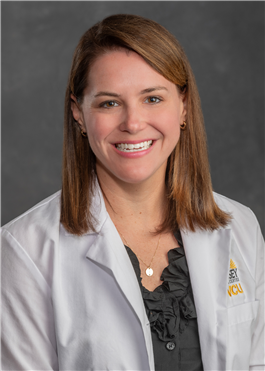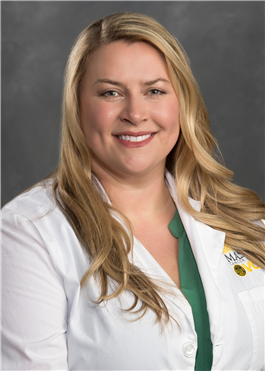Latest News
Clinical Care, Prevention
Gynecologic Cancer Awareness Month - What you should know
Sep 18, 2025
.jpg)
September is Gynecologic Cancer Awareness Month - a time dedicated to spreading vital information on cervical, ovarian, uterine, vaginal and vulvar cancer. The National Cancer Institute estimates that around 110,850 women will be diagnosed with a form of gynecologic cancer in 2025. With so many lives impacted by these disease types, it’s crucial to understand the signs.
We sat down with Jaclyn Wall, M.D., and Chelsea Salyer, M.D., two gynecologic oncologists at VCU Massey Comprehensive Cancer Center, to learn more about gynecologic cancers, including what symptoms to look out for, when to get screened, and other critical advice.
Jaclyn Wall, M.D.
How did your interest in gynecologic oncology begin?
I was always interested in oncology before I started medical school. In my second year of medical school, I was introduced to the field of GYN oncology. I was very interested in the pathology and impact on women’s health. What really hooked me was learning that it’s a full scope of practice, so you provide both surgery and chemotherapy and deliver longitudinal care. I was drawn to the opportunity to have this long-term relationship with my patients.
What inspires you to do this work?
I find it’s a real privilege to take care of our patients and provide them with the care they need. Having cancer in general is really vulnerable, but when having a gynecologic cancer, patients come in with a very vulnerable experience. Providing a safe environment where patients feel comfortable and supported is so important. Our patients are so inspiring and resilient.
Chelsea Salyer, M.D.
How did your interest in gynecologic oncology begin?
When I was in college, my dad was diagnosed with cancer and later passed away. That experience made me want to go into medicine. I'd always been fascinated by women's health. I also love health policy and advocacy.
When I was in residency, I did an oncology rotation, and it was the perfect opportunity to do all the things I loved: caring for cancer patients, which touched on my experiences with my dad, being an advocate, a surgeon, and a medical doctor all in one.
What inspires you to do this work?
Definitely my patients. Seeing their successes and their wins. And, just knowing that I get to be a part of their lives in this super challenging time, and being there for them no matter what happens on their cancer journey.
Gynecologic Cancer 101
What types of cancer fall under the gynecologic category?
Dr. Wall: We treat patients who have cancers of the uterus, cervix, ovaries, vulva, and vagina. There's a subset called primary peritoneal cancers, which are very similar to ovarian cancers.
The most common gynecologic cancer is uterine cancer, especially in the metropolitan Richmond area. We treat a high frequency of uterine cancer patients, as well as patients who have more aggressive types of uterine cancer. This comes with some unique challenges and opportunities to help improve patient outcomes as we work to discover the best treatment strategies.
Dr. Salyer: In fact, of the uterine cancer patients coming into Massey, 60% are Black women, many of whom report post-menopausal bleeding. So this is a symptom that shouldn’t be overlooked.
At what age should people start getting screened for gynecologic cancers?
Dr. Wall: There is no screening for most gynecologic cancers, unfortunately. However, cervical cancer screening is highly important. Patients who have a cervix should begin routine cervical cancer screening with their primary OBGYN at age 21 and then continue until the age of 65, unless they have a history of high-grade abnormal Pap smears.
What are the standard screening procedures for gynecologic cancers?
Dr. Wall: A point of confusion for some patients is that every pelvic exam is a Pap smear. A Pap smear is a special test where a brush is used to get a sample of cells from your cervix. The general interval for cervical cancer screening is as follows: if you have a negative test, the Pap smear is every 3 years, and then once you reach a certain age, we do HPV testing with the Pap smear. We are looking at opportunities for patients to be able to do self-screening at home.
What are the treatment options for gynecologic cancers?
Dr. Salyer: Treatment options depend on patient factors, stage of disease, patient preference and life goals. With cervical cancer, if it is in an early stage, it’s usually treated with surgery. If it's in a late stage, we do chemotherapy and radiation, as well as immunotherapy with a medicine called Keytruda.
For endometrial cancer, the standard of care mainstay is surgery. Depending on what kind of uterine cancer it is, sometimes patients also need chemotherapy, radiation, or both.
For certain types of uterine cancer in young women who desire fertility, we can also treat with hormone therapy, like an IUD or an oral hormone pill. Sometimes, for patients who aren't surgical candidates, we can just do radiation alone. Then, ovarian cancer gets a combination of chemotherapy and surgery. Sometimes, other targeted drugs like PARP inhibitors are used.
I am also one of the few gynecologic oncologists in Virginia who offers hyperthermic intraperitoneal chemotherapy (HIPEC) at the time of ovarian cancer debulking surgeries, which involves infusing heated chemo at the time of surgery. It's one of the few things that shows a 14-month survival benefit.
What are the side effects of gynecologic cancers?
Dr. Wall: Radiation techniques now are much better than they were many years ago because they are tailored specifically to each patient, which helps minimize toxicity. However, acute and long-term side effects can still be very significant. A lot of these women might be in their 30s, 40s, or 50s. Receiving pelvic radiation can cause bowel toxicity, resulting in diarrhea and gastrointestinal issues.
Long-term, it can cause significant vaginal shortening and narrowing, and so if patients are not having regular intercourse, they have to use dilators to keep the vagina open. This is important because we need to be able to look inside to make sure that there are no signs of recurrence as well as to preserve sexual function.
The ovaries are also in the radiated field. So, if you're getting radiation to your pelvis, this can result in early menopause. Therefore, following radiation, we discuss and offer hormone replacement therapy to patients to treat hot flashes and night sweats, as well as other symptoms from menopause. They may develop vaginal atrophy, or loss of moisture in the vagina. We recommend and offer vaginal estrogen for this to help keep the vaginal tissue healthy, as well as to prevent intercourse from being painful.
What are some common misconceptions about gynecologic cancers?
Dr. Salyer: Some patients wonder where they went wrong if they’ve been getting Pap smears their whole lives. Most of the time, when you get cancer like this, it's just bad luck. There’s nothing you did to cause it.
I also run the clinical trial program, and there's sometimes a misconception that clinical trials are experimental drugs. They’re not - they've had a lot of science to get developed, and the goal is to improve the standard of care, not give you something that won't work as well.
A lot of times, people assume all cancers are treated surgically. In some advanced cervical cancer cases, for example, we actually see better outcomes with chemo and radiation, without removing the cervix.
A lot of women, especially Black women, have had fibroids or abnormal bleeding their whole lives. They assume that bleeding is normal. Doctors have normalized their bleeding. So, when they get older, there's no trigger of, ‘This is bad. I should report it.’ It’s not our patient's fault; it's a lifetime of normalizing patient symptoms and dismissing their concerns.
Are there any ways to reduce the risk of gynecologic cancers?
Dr. Wall: Cervical cancer is almost entirely preventable. Almost all cervical cancer is driven by HPV, and it can be prevented by the HPV vaccine. The HPV vaccine should be given to adolescents when they're around their early middle school years. Studies have been done that show the eradication of HPV-caused cervical cancers in patients who are adequately vaccinated. The second step for patients who have a cervix is to undergo routine cervical cancer screening with their primary OBGYN.
Is Massey conducting any clinical trials for these cancers?
Dr. Salyer: Dr. Wall and I both run the clinical trials program for gynecologic cancers. Many of our newer trials are focused on a class of drugs called antibody drug conjugates, or ADCs. This class of drugs is a type of targeted therapy that's been shown to work well, especially in ovarian and uterine cancers.
We have some other novel targeted therapies. We have some surgery trials, like for our patients with BRCA. We have one that's looking at outcomes of just removing the tubes, and then doing the ovaries later. In most BRCA patients, their ovaries should be removed sometime between the ages of 35 and 40. The hope is that it gives you the same cancer risk reduction but avoids the adverse outcomes of premature menopause.
We're also looking to open a cancer screening trial through a partnership with Mayo Clinic. They developed a test that detects tumor DNA for uterine and ovarian cancers. We also had some immunotherapy trials that we're doing in conjunction with the cancer center. They're in phase one.
How does Massey collaborate across its service lines to deliver comprehensive cancer care?
Dr. Wall: One of our strengths is having easily facilitated connections with different groups that we work with. So, we work a lot with breast oncology, especially for patients who have BRCA mutations, who might have breast and ovarian cancer.
We work with the survivorship clinic and surgical oncology because sometimes we'll have a patient whose primary site of disease is unknown, so we'll need to do a big surgery to figure out where the disease originated. We will take the cases together so that we can each complete the appropriate part of the procedure, which gives the patient a multidisciplinary team across specialties, who are all in their surgery, rather than having two separate procedures.
Learn more about Massey’s gynecologic cancer treatment team.
Written by: Tatiana Del Valle
Related News
Clinical Care, Patient Stories
How a friend’s leukemia inspired a career in oncology nursingDec 16, 2025
Clinical Care, Prevention
VCU Massey now offers new technology for early detection of lymphedemaDec 8, 2025
Clinical Care, Patient Stories
Breast cancer survivor heals her heart, leans into advocacy for othersDec 1, 2025

Get access to new, innovative care
Treatments in clinical trials may be more effective or have fewer side effects than the treatments that are currently available. With more than 200 studies for multiple types of cancers and cancer prevention, Massey supports a wide array of clinical trials.

Find a provider
Massey supports hundreds of top cancer specialists serving the needs of our patients. Massey’s medical team provides a wealth of expertise in cancer diagnosis, treatment, prevention and symptom management.


